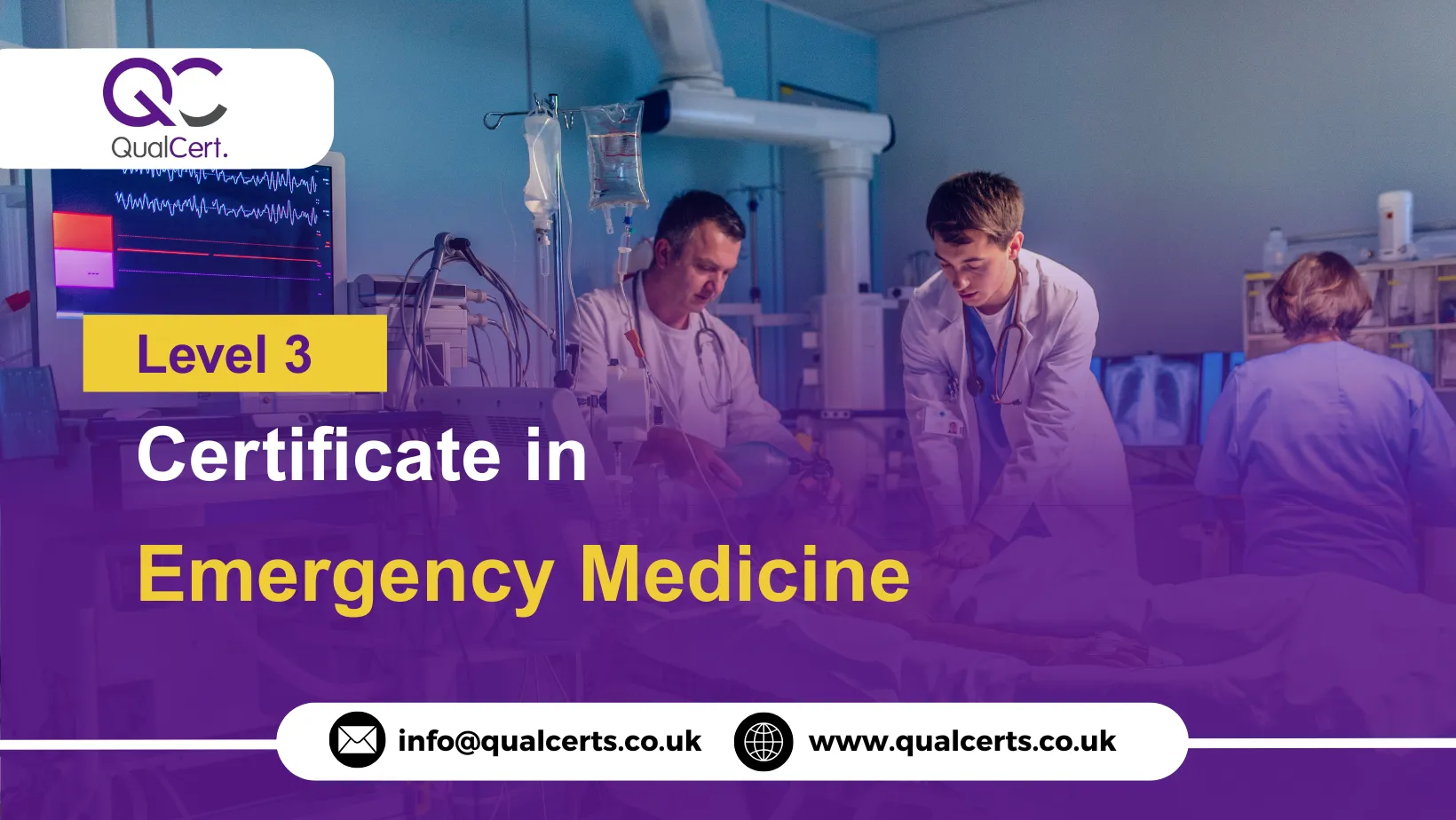The QualCert Level 3 Certificate in Emergency Medicine is a specialised qualification designed to provide learners with the essential knowledge and skills required to respond effectively in urgent and high-pressure medical situations. This course introduces learners to the core principles of emergency care, clinical assessment, and the management of acute medical conditions, making it an excellent starting point for those pursuing a career in healthcare or emergency services.
Emergency medicine is a vital area of healthcare, focusing on the immediate recognition, stabilisation, and treatment of patients with critical illnesses or injuries. This qualification ensures that learners gain a strong foundation in the theory and practice of emergency response, while also emphasising patient safety, communication, and ethical practice in urgent care environments.
This qualification equips learners with practical and theoretical knowledge aligned with international standards of emergency medical education. By completing this course, learners will develop an understanding of how to respond to life-threatening emergencies, manage trauma cases, and provide essential support in fast-paced healthcare environments.
It also serves as a pathway to further study in paramedicine, nursing, or advanced healthcare qualifications. For individuals already working in healthcare support roles, this course provides an opportunity to enhance professional practice and increase career prospects within emergency and urgent care services.
Learners who successfully complete this qualification may progress to higher-level courses in healthcare, such as Level 4 or Level 5 qualifications in paramedicine, nursing, or critical care. It also provides an excellent foundation for those seeking to specialise further in trauma management or pre-hospital emergency care.
Course Contents of QualCert Level 3 Certificate in Emergency Medicine:
The QualCert Level 3 Certificate in Emergency Medicine, offers 20 Credits, requiring a Total Qualification Time (TQT) of 100 hours, including 70 Guided Learning Hours (GLH).
| Unit Ref# | Unit Title | Credit | GLH | TQT |
| QC27079-1 | Fundamentals of Emergency Medicine | 4 | 14 | 20 |
| QC27079-2 | Patient Assessment and Triage in Emergency Care | 4 | 14 | 20 |
| QC27079-3 | Management of Acute Medical and Trauma Emergencies | 4 | 14 | 20 |
| QC27079-4 | Life-Saving Interventions and Pre-Hospital Care | 4 | 14 | 20 |
| QC27079-5 | Professional Practice, Communication, and Ethics in Emergency Medicine | 4 | 14 | 20 |
Entry Requirements for the QualCert Level 3 Certificate in Emergency Medicine:
Minimum Age
Learners must be at least 16 years old at the time of registration.
Educational Background
A minimum of a Level 2 qualification (or equivalent) is recommended. Applicants without formal qualifications may be considered if they can demonstrate relevant knowledge or prior experience in healthcare or related fields.
Experience
No prior work experience is required, although previous exposure to healthcare, first response, or emergency support services will be an advantage.
Language Proficiency
Learners must demonstrate English proficiency at Level 2 or equivalent to ensure they can understand and complete written assignments, case studies, and practical assessments.
Learning Outcomes for the QualCert Level 3 Certificate in Emergency Medicine:
Fundamentals of Emergency Medicine
- Understand the principles and scope of emergency medicine
- Explain the roles of emergency healthcare professionals in hospitals and pre-hospital settings
- Recognise common emergencies and their impact on patient outcomes
- Demonstrate knowledge of emergency department protocols and procedures
Patient Assessment and Triage in Emergency Care
- Apply principles of patient assessment in emergency settings
- Identify vital signs and recognise signs of critical illness or injury
- Understand triage procedures and prioritisation of care
- Develop skills in documenting and communicating patient information accurately
Management of Acute Medical and Trauma Emergencies
- Recognise and respond to acute medical conditions such as cardiac arrest, respiratory distress, and severe bleeding
- Understand trauma management principles, including fractures, burns, and head injuries
- Apply safe and effective interventions to stabilise patients
- Demonstrate knowledge of emergency protocols for different types of medical and trauma cases
Life-Saving Interventions and Pre-Hospital Care
- Understand the principles and techniques of basic life support (BLS) and cardiopulmonary resuscitation (CPR)
- Recognise when advanced interventions are required and understand referral procedures
- Apply principles of pre-hospital emergency care and patient transport
- Demonstrate knowledge of safety measures for both patients and healthcare providers
Professional Practice, Communication, and Ethics in Emergency Medicine
- Apply professional and ethical standards in emergency care
- Demonstrate effective communication with patients, families, and healthcare teams
- Recognise the importance of teamwork in high-pressure environments
- Understand legal responsibilities, confidentiality, and safeguarding in emergency healthcare
The QualCert Level 3 Certificate in Emergency Medicine is suitable for:
- Aspiring healthcare professionals seeking to specialise in emergency care or urgent response services
- Healthcare support staff who want to gain skills in acute and trauma care
- Individuals interested in pursuing careers in paramedicine, ambulance services, or hospital emergency departments
- Students preparing for further study in nursing, critical care, or advanced emergency medical qualifications
- Professionals in healthcare or community support roles wishing to enhance their knowledge of emergency medicine
Centres offering this qualification must ensure the following:
- Tutors and assessors are appropriately qualified with expertise in emergency medicine, healthcare, or first response
- Learners have access to up-to-date learning resources, including case studies, emergency protocols, and reference materials
- Opportunities for applied learning through simulations, case studies, or workplace-based observation are provided where feasible
- Internal quality assurance processes are in place to maintain fairness, consistency, and reliability in assessment
- Learners are supported with guidance, feedback, and academic support throughout the course

